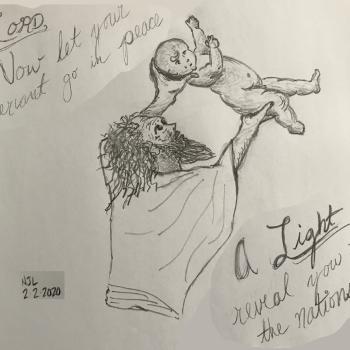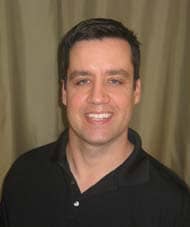Gay marriage has become the third rail for Evangelicals in American public life, and Miss California just got shocked. The beauty queen and Christian college student seemed on her way to being crowned Miss USA, when she got struck. Asked a question about Vermont's legalization of gay unions, Carrie Prejean responded, "We live in a land that you can choose same-sex marriage or opposite marriage. And you know what, in my country, and in my family, I think that I believe that a marriage should be between a man and a woman. No offense to anybody out there, but that's how I was raised."
But, offense was taken, and with those words the sash, song, and scholarship slipped away. Pundits everywhere mocked her for both her impolitic stand in a system strongly supported by the gay community as well as the unsure, halting way in which she expressed it, many pondering what "opposite marriage" might mean. A British Member of Parliament even joked that he might murder her.
However, what made her a fool and villain to some, made her a hero to others. In the weeks that followed, conservative talk shows saluted Prejean for her courage, the National Organization for Marriage featured Prejean's response in a $1.5 Million ad campaign, and Today Show host Matt Lauer compared her to another beauty queen, turned conservative icon, Sarah Palin. All this came to a screeching halt, however, when racy photos appeared on the internet, putting into question whether Prejean would be able to continue as Miss California as well as her usefulness to conservative, pro-family organizations.
Miss California is a one-month morality tale for Evangelicals who speak publicly about same sex marriage. Lest we believe that this is just a problem of pageant interviews going beyond the expected affirmation of "world peace," the recent experiences of well known Evangelical leaders offer other lessons.
When Pastor Rick Warren of California's Saddleback Church endorsed Proposition 8, the controversial initiative, which constitutionally defined marriage as between one man and one woman, he immediately encountered local protests.
Then, when Barack Obama tapped Warren to deliver an inauguration prayer, the local backlash burst into a national firestorm. Many progressives branded the laid back author of best-selling devotional books, "one of America's most extremist pastors." Glenn Greenwald, host of Salon Radio labeled Warren destructive, inflammatory, and fanatical, comparing him to White Supremacists, Anti-Semites, and Iranian President Mahmoud Ahmadinejad. While cable news channels featured talking heads who excoriated Obama's choice, Newsweek took the unusual step of assigning one of its reporters a cover story opinion piece that made a theological argument from the Bible for same sex marriage and charged opponents with wooden fundamentalism.
Evangelical insiders found these reactions puzzling. Most understood that leaders like Ted Haggard had brought accusations and scandal by publicly opposing gay marriage, while privately seeking out male escorts. However, Warren had established a cooperative, authentic, and non-confrontational reputation. His work with progressives on AIDS, poverty, and global warming had even caused some conservatives to distrust him as secret liberal. Sandra Alvarado, an independent consultant from Miami, sees the polarizing response as unfair, and blames Christian cowardice for letting Warren flap in the wind. "Maybe if we would stand up for something, the Rick Warrens of this world would not be ridiculed." But, in the controversy's wake, Warren was left defending himself. Stressing his overall tolerant attitude, he has publicly visited friends in West Hollywood and qualified his stance on Larry King.
And, it's not just opponents of same sex marriage that have found the subject perilous. Evangelicals who have expressed openness to civil unions or marriage have encountered stiff opposition and rejection from within their own ranks. For instance, when National Association of Evangelicals Vice President Richard Cizik confessed in a December, 2008 interview with Terry Gross of the National Public Radio program Fresh Air, that he was "shifting" on the issue and would support civil unions, he soon found himself in hot water with his employer. Nine days later NAE President Leith Anderson announced that Cizik had resigned after almost 30 years with the organization. Anderson explained the departure as necessary because Cizik's NPR interview "did not appropriately represent the values and convictions of NAE and our constituents." Ironically, Cizik had held onto his job for years while advocating activism against global warming, a position that exasperated many conservatives. However, his offhand comments on civil unions ended the relationship in an instant.
Many evangelical moderates find the public impasse saddening. Joy Ericson, a fundraiser for a non-profit organization in Southern California, laments, "It's just one of many issues where we are torn between two truths that are difficult to reconcile in our fallen world." She explains, "On the one hand we have the biblical teaching on sin and repentance and on the other hand the truth that each one of us is the beloved creation of God, to be treated with dignity and respect."
Whatever their stance, these stories indicate the risks taken by the pastors, lobbyists, and even beauty queens who jump into the same sex marriage debate. Whether in support, opposition, or offering some sort of mediating position, the issue has proven to be shockingly dangerous to their careers. Some may be able to hop the theological tracks and dodge the political trains, but others have tripped and learned to stay away from the third rail.
5/12/2009 4:00:00 AM





